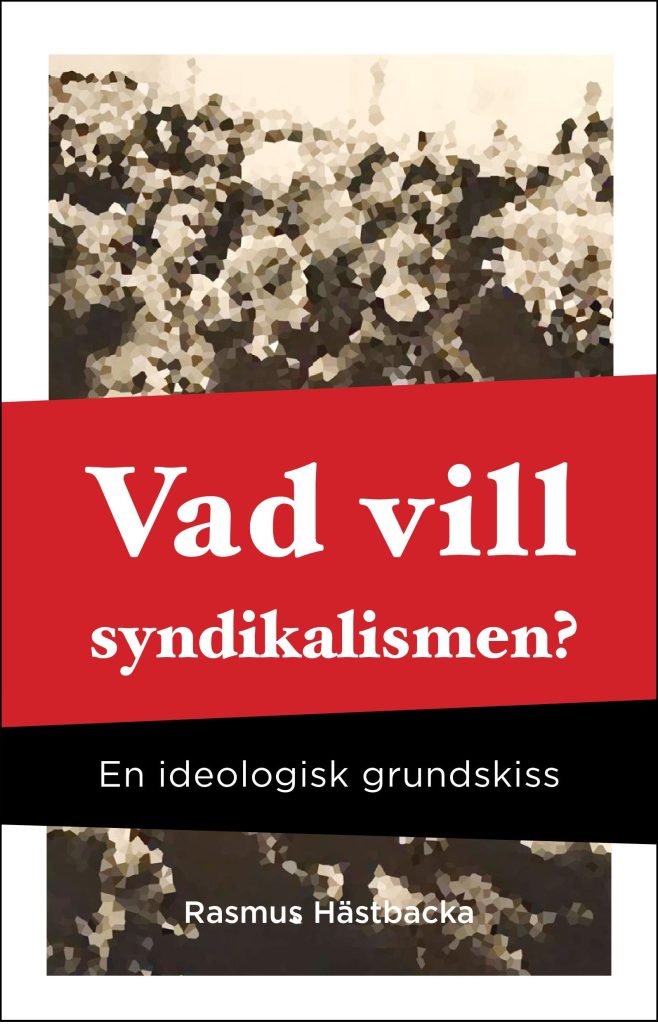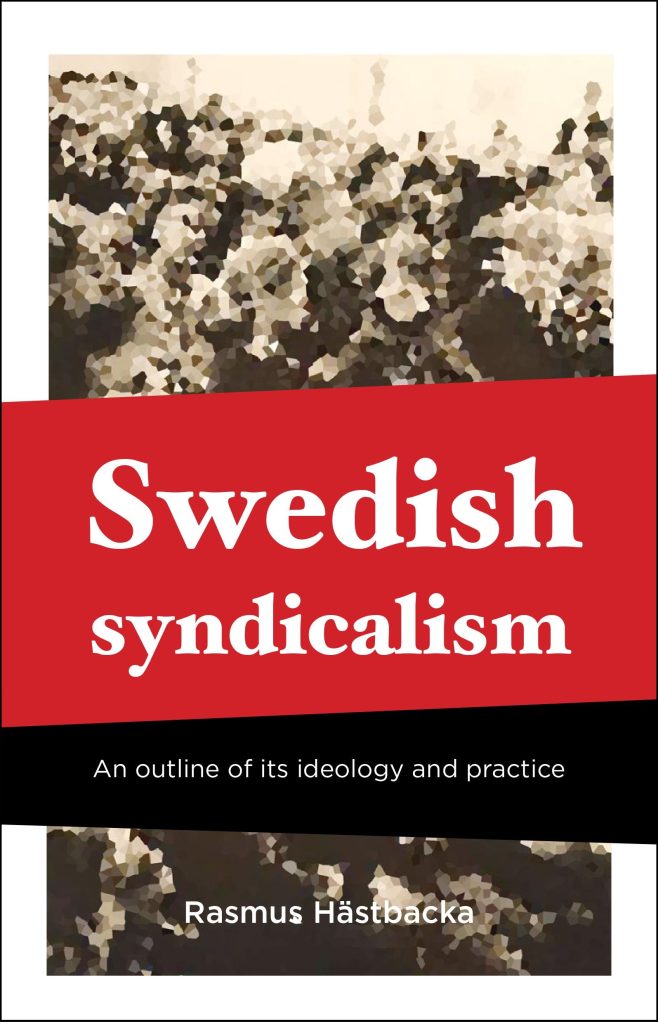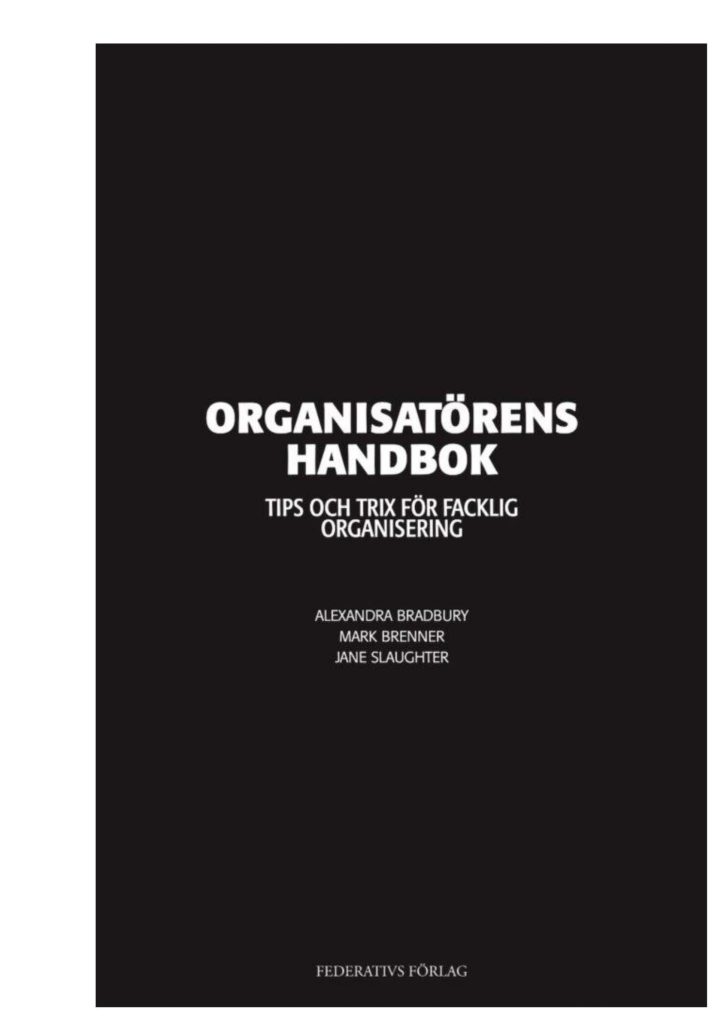

Klicka nedan för att köpa eller ladda ned boken, läsa recensioner och andra artiklar, spisa videoföredrag och podcastavsnitt.
Click below to buy or download the book, read articles or listen to podcast.
BOKEN PÅ SVENSKA
Hösten 2021 gav Umeå LS av SAC ut häftet Vad vill syndikalismen? som en enkel PDF-fil. År 2024 släppte SAC texten som tryckt bok i samarbete med Federativs förlag. Boken genomgick en finputsning inför tryck och SAC:s centralkommitté lade till ett förord.
Köp tryckta boken >>här>>
Boken som utskriftsvänlig PDF >>här>> (stående A4) och >>här>> (liggande A4)
Boken på bibliotek >>här>>
Recensioner
Upplysande bok som besvarar frågor om vad syndikalism är idag av Catharina Bergman i Syndikalisten webbtidning
En bok om facklig organisering av Anders Svensson på Blog Zaramis
Det kommer mera…
Videoföredrag
Syndikalismens idé och praktik – En fet introduktion
Bygger på böckerna Vad vill syndikalismen?, Organisatörens handbok och Något har hänt.
Podcastavsnitt om samtida syndikalism
Intervjun Organisera, inte bara mobilisera med Daria Bogdanska i Malmö LS av SAC
Intervjun Sveriges arbetares ädla förening med Emil B och Pär H i Göteborgs LS av SAC
Intervjun Hemmasnickrad moral med Pelle Sunvisson i Stockholms LS av SAC
Artiklar om bokens ämne
Här samlas ytterligare artiklar om Vad vill syndikalismen? och ett urval andra texter som anknyter till bokens ämne.
Grundbok om syndikalism – hur kan den användas? av Rasmus Hästbacka i tryckta tidningen Syndikalisten
Vad är syndikalismen och vad är den bra till? av Rasmus Hästbacka på hemsidan Anarkism.info
Teslakonflikten: Vad krävs nu för att slipa strejkvapnet? av Amalthea Frantz i tidningen Arbetaren
Andra arbetarrörelser är möjliga av Amalthea Frantz i Arbetaren
De tar fajterna tillsammans av Solveig Betnér i Syndikalisten webbtidning
Organisera! Ja men hur då? av Rasmus Hästbacka i Magasinet Konkret
Solidariska byggare – facket som tar strid för sina medlemmar av Volodya Vagner i Arbetaren
Det går att organisera migranter – Intervju med Pelle Sunvisson i tidningen Allt om arbetsmiljö
Facklig strid – en fusklapp av Rasmus Hästbacka i Syndikalisten webbtidning
Kollektivavtal för kriminella av Emil Boss i Arbetaren
”Indian rules” förebådar framtidens arbetsmarknad av Emil Boss i Arbetaren
Så kunde byggbolag tvätta nästan en halv miljard i sedlar av Emil Boss i Arbetaren
Lagar, konflikter, stress och press av Solveig Betnér i Syndikalisten webbtidning
Fusklapp för skyddsombud av Rasmus Hästbacka i Syndikalisten webbtidning
Den svenska modellen är uträknad – Intervju med Gabriel Kuhn i Arbetaren
Hur jobbar framgångsrika fackföreningar? av Rasmus Hästbacka i Arbetaren
Arbetarna som vägrar lämna fabriken av Julia Lindblom i Arbetaren
Amazonifieringen av samhället genomlyst av Nette Wermeld Enström i Arbetaren
Här är jobben som kan ersättas av AI av Axel Green i webbtidningen Arbetsvärlden
Därför är jag inte förvånad över att SEKO blåste av strejken av Viktor Boström i Arbetaren
Konsten att radikalisera en fackförening av Frederick Batzler i Arbetaren
Den ekonomiska vintern och smärtans ekonomi av Annie Hellquist i Arbetaren
Hotet från gula fack och avtalsshopping av Rasmus Hästbacka i Syndikalisten webbtidning
Nya SD-stödda facket ska teckna avtal med SD-företagare av Axel Green i Arbetsvärlden
Att rösta eller inte rösta? Det är inte frågan av Edvin Dahlgren på hemsidan Anarkism.info
Socialism underifrån av Tom Karlsson i den finlandssvenska tidskriften Ny Tid
Upphäv tankeförbudet kring ekonomiska alternativ av Toivo Jokkala och Per-Anders Svärd i Arbetaren
Pendelstrejken visar behovet av medlemsstyrda fackföreningar av Rasmus Hästbacka i Ordfront Magasin
USA:s gruvarbetare kräver ”en rättvis omställning” av Harald Gatu i tidningen Dagens Arbete
En grön Lenin? av Per-Anders Svärd i Arbetaren
När hatet mot löneslaveri var mainstream av Lars Högström i Arbetaren
Samförstörelsens anda och de byråkratiserade sociala rörelserna av Daria Bogdanska i tidningen Brand
Hur kan syndikalismen växa? av Rasmus Hästbacka i tryckta tidningen Syndikalisten
Förberedelser för ett frihetligt samhälle – Intervju med Jason Chrysostomou i Arbetaren
Se också Lathundar för organisering baserade på Organisatörens handbok
Se vidare Malmö LS Handbok för syndikat (nio sidor)

Vad är skillnaden mellan boken Vad vill syndikalismen? (2024) och häftet (2021)?
Som sagt genomgick manuset en finputsning inför tryckning och ett förord lades till. Boken speglar stadgeändringar som gjordes på SAC:s kongress 2022. Finputsningen innebär också att pronomenet ”man” har ersatts av könsneutrala formuleringar. Vidare används begreppet icke-binär där det är relevant. Det refererar till personer som varken identifierar sig som man eller kvinna. Begreppet HBTQIA har också tillförts texten. Det är ett paraplybegrepp för homosexuella, bisexuella, transpersoner, queer, intersexpersoner och asexuella.
BOOK IN ENGLISH
In the fall of 2021, the Umeå Local of SAC published Swedish syndicalism as a simple PDF file. In 2024, SAC released the text as a printed book in collaboration with Federativ Publishing House. The text was refined before printing and SAC’s central committee added a preface.
Buy the printed book >>here>>
The book as printer-friendly PDF >>here>> (vertical A4) and >>here>> (horizontal A4)
Book in Swedish libraries >>here>>
Articles on the book’s subject matter
Below, you see articles about the book and a selection of other texts related to the book’s subject matter.
Organize! Yes, but how? by Rasmus Hästbacka on the website Znetwork
Radical Union Organizing in the Nordic Countries – PDF pamphlet edited by SAC’s international committee
Basic book on syndicalism – some tips on how to use it by Rasmus Hästbacka on the website Libcom
What is union action? Bust the myths! by Rasmus Hästbacka in the US labor magazine Industrial Worker
Ten years ago, Chicago teachers gave us all a jolt of hope by Alexandra Bradbury on the website of Labor Notes
Swedish unions in crisis by Rasmus Hästbacka on the website Counterpunch
What worked and what didn’t: A history of organizing at Starbucks by Nick Driedger on the union website Organizing Work.
Sweden: How Do Successful Unions Operate? by Rasmus Hästbacka on Znetwork
Let’s find alternatives to striking by Kristian Falk and Rasmus Hästbacka on Organizing Work
Don’t complain, organize! by Ellen David Friedman on Labor Notes
A syndicalist strategy for the Swedish labour market by Jenny Stendahl, Erik Bonk and Rasmus Hästbacka on Counterpunch
The upside-down pyramid on Organizing Work
Bust the myths about collective agreements by Emil Broberg and Rasmus Hästbacka on Znetwork
Sweden’s unions need to wake up to new forms of exploitation by Volodya Vagner in Jacobin Magazine
Builders in Solidarity by Volodya Vagner on the website Meduza
Boom without bust: Solidarity unionism for the long term by MK Lees and Marianne Garneau on Organizing Work
Socialist leaders won’t save unions – Interview with Nick Driedger about the “rank-and-file strategy” on Organizing Work
Big strikes and the sabotage of the labor movement by Marianne Garneau on Organizing Work.
Syndicalism for the 21st century: From unionism to class-struggle militancy by Torsten Bewernitz and Gabriel Kuhn on Counterpunch
Syndicalists shouldn’t have a black-and-white view on organizing by Rasmus Hästbacka on Libcom
The case for building new unions by Tom Wetzel on the website Black Rose, a shortened text from Wetzel’s book Overcoming Capitalism.
How can syndicalism grow? Notes from Sweden by Rasmus Hästbacka Znetwork
Anarcho-syndicalism: A historical closed door…or not? by Harald Beyer-Arnesen in the US labor magazine ASR
Let’s build class unions by Rasmus Hästbacka in the Industrial Worker
Militant unions – the backbone of ”movement socialism” by Edvin Dahlgren on Znetwork
A history of IWW’s organizer training program by Marianne Garneau on Organizing Work
Another World is Phony? The case for a syndicalist vision by Rasmus Hästbacka on Libcom
See also SAC’s short guides to organizing based on the book Secrets of a successful organizer
There are many good union podcasts in English. For instance, check out Wobcast, produced by members of the North American union IWW.
Read Secrets of a successful organizer!

What is the difference between the book Swedish syndicalism (2024) and the PDF (2021)?
As said, the script was refined before printing and a preface was added. The book reflects bylaw changes made at the 2022 SAC congress.The refinement also means that the term non-binary has been included in the text. It refers to persons who do not identify as male or female. The term LGBTQIA has also been added. It is an abbreviation for lesbian, gay, bisexual, transgender, queer, intersex and asexual persons.
VANLIGA FRÅGOR / FAQ ON SYNDICALISM
På vår gamla hemsida fanns en klickbar ”FAQ” (”frequently asked questions”, vanliga frågor) om syndikalism, baserad på första delen av boken Vad vill syndikalismen? Hela boken är disponerad som en FAQ i fyra delar. Du kan helt sonika bläddra i PDF:en eller den tryckta boken, så har du en FAQ med 59 frågor och svar.
Previously, there was a clickable FAQ about syndicalism here, based on the first part of the book Swedish syndicalism. The entire book is structured as a four-part FAQ. You can simply browse the PDF or printed book, and you have an FAQ with 59 questions and answers.
PRINCIPFÖRKLARING / DECLARATION OF PRINCIPLES
ESPA / FRAN / PORT
Vissa artiklar som bygger på boken Vad vill syndikalismen? har översatts till spanska, franska och portugisiska.
A number of articles based on the book Swedish syndicalism have been translated into Spanish, French and Portuguese.
Español
Algunos artículos basados en el libro han sido traducidos al español.
Sindicatos suecos en crisis: ¿qué soluciones ofrecen los sindicalistas?
¿Qué es la Acción Sindical? ¡A romper los mitos!
Construyamos Sindicatos de Clase
¿Por qué afiliarse a un pequeño sindicato sindicalista cuando hay grandes sindicatos burocráticos?
Una estrategia sindicalista para el mercado laboral sueco
FAQ sobre el sindicalismo (SAC Suecia)
Français
Certains articles basés sur le livre ont été traduits en français.
Ça commence sur ton lieu de travail
Trouvons d’autres solutions que la grève!
Qu’est-ce que l’action syndicale ? Briser les mythes !
Português
Um artigo baseado no livro foi traduzido para o português.
TRANSLATE THE BOOK?
According to the license printed at the beginning of the book, everyone is free to copy and spread the book for non-commercial purposes.
The same goes for translating and publishing the book in other languages. We have only two conditions: that you follow the license and print it at the beginning of your version of the book. So go ahead, translate and publish! You don´t have to wait for permission from the author or SAC and you don’t have to pay us anything.
If you have completed a version of the book, we would be happy if you send us an email (umea.ls[a].sac.se), so we can add a link from this site to your product.
A translation into Portuguese is in the pipeline…
GÅ TILL SIDANS TOPP / TOP OF PAGE
TILL UMEÅ LS STARTSIDA / START PAGE